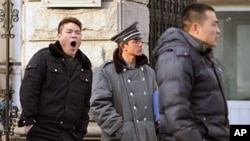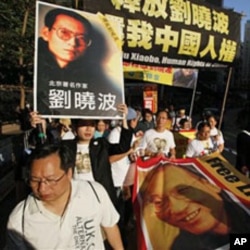China's government is attempting to limit the impact of the awarding of the Nobel Peace Prize to imprisoned Chinese dissident Liu Xiaobo. Analysts and rights activists say that although the immediate affect of the award on political reform in China will likely be minimal, Liu receiving the peace prize shows that China's tightly controlled society is continually pushing for change.
China has warned countries not to attend Friday's ceremony in Oslo - criticizing the Nobel Committee, calling the award "profane" and accusing the international community of meddling in China's internal affairs.
Kwame Anthony Appiah, president of the PEN American Center, a writers' group that promotes freedom of expression, spoke about Liu at a recent U.S. congressional committee hearing - sponsored by the Congressional Executive Commission on China. He said that despite Beijing's reaction, Liu's treatment is an international matter.
"By detaining Liu Xiaobo for more than a year and then by convicting and sentencing him to 11 years in prison - in clear violation of his most fundamental internationally recognized rights - the People's Republic of China itself has guaranteed that his case is not and cannot be a purely internal affair," said Appiah.
In China, the government has limited access to information about Liu Xiaobo receiving of the Nobel Prize, blocking Internet access to overseas articles about the award and disseminating information critical of Liu.
Researcher Phelim Kine of Human Rights Watch says that the information most Chinese have received about Liu has been negative and that few people know of him. Speaking at the same congressional committee hearing, Kine said Beijing's focus on the Nobel laureate will draw more attention to Liu and the ideas he has advocated.
"What the Liu Xiaobo Nobel has created for the Chinese government is a 'running sore' that's going to continue as long as he is imprisoned. As long as there is a news story that refers to imprisoned Chinese Nobel laureate Liu Xiaobo. This is a huge embarrassment for the Chinese government," Kine said.
Kine says he is optimistic that the award will generate more discussion about how similar cases should be handled in the future. Soon after Liu's award was announced, 23 senior retired former communist party officials and intellectuals issued a public letter calling Liu a "splendid choice" and urging the Chinese government to end its censorship of free speech.
"This is the beginning of a trend that we are going to see. Obviously, there is going to be discussion between moderates and the people who really fought for and won in terms of punishing Liu Xiaobo," he added.
Liu Xiaobo is serving an 11-year sentence for what the Chinese government says is subversion of the state. He co-authored an online petition that called for democratic reform in China.
Analysts note that as Chinese authorities control access to the Internet, the medium is being used to organize protests and inform the public about corruption and local grievances.
Elizabeth Economy with the Council on Foreign Relations in New York told the congressional committee that China's leaders fear a loss of control over access to information.
"The Internet is a political organizing force. It can educate as in the case of the online discussion with the Dalai Lama on Twitter," Economy said. "It can help bring more than 7,000 people to protest in Xiamen. It can bring pressure to bear on authorities for unjust decisions by a swell of outrage on the Internet. In a sense, every Chinese citizen with a cell phone and Internet access becomes a journalist."
Political scientist Bruce Gilley of Portland State University agrees.
"It's precisely because they have lost control of the ability to manage political speech and information that we see this stepped up effort to plug the holes in the dam. But we have to focus on what is happening to the dam rather than the holes they are trying to plug," he said.
Gilley told the panel that when the United States thinks about the policies it adopts with respect to China, it should carefully consider the impact of those policies on domestic reforms.
"Just as we in some ways mistook what is happening in the Soviet Union in the 1980s, we are in danger of mistaking what is happening in China today," Gilley said.
As for Liu Xiaobo's fate, analysts say that Chinese leaders eventually will be forced to release him into foreign exile under the weight of international pressure.





